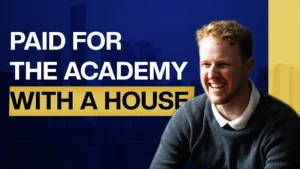Financial consultant Ben Read quit his £45,000 a year job to go into property full time. Now he and his partner Rachel Rome are making about £35,000 a month from selling deals and a rent-to-serviced accommodation portfolio. They provide an end-to-end service for investors who include some of their landlords after training on Samuel Leeds’ academy.
‘We’ve sold 20 deals, charging £5,000 for each one.’
“When you look at being employed it’s like being paid to forget your dreams,” says Ben.
He was working 60 to 70 hours a week in the NHS. Rachel was also putting in similar hours as a nurse. So, they reassessed their lives and decided to go down a different route.
“We thought, how can we have a better way of life and have life on our terms because we were having hectic, chaotic weeks,” remembers Ben.
Ben and Rachel had always been around property, with all types of tradesmen and architects in the family. They had also done up property before and had some knowledge of strategies like buy, refurbish, refinance and so homed in on that.
The couple enrolled on a course with Samuel Leeds Education to learn more about the investment method and then joined the academy.
The more they learnt the more they realised their priority was to build cash flow. So, they got several serviced accommodation properties up and running.
“That gave us the cash flow to enable Ben to leave his job which gave us the time to then focus on deal sourcing, BRRs and project management. Ultimately, it’s about understanding what you’ve got to hand and how best you can make that work for you.”
They now have four serviced accommodation properties – three in Greater Manchester and one in Liverpool.
“The revenue on average is about £6,000 a month across the four properties. That’s profit,” says Rachel.
“Some months it’s been more than that when we’ve got three to four-month direct trade bookings,” Ben adds.
They aim to take on houses mostly, rather than city centre apartments, with their target guests being contractors, professionals and people in between moves.
Some of these deals have been passed on to investors. So far Ben and Rachel have sold 20 deals through their business, Synergy Estates, charging a £5,000 finder’s fee for each one.
‘Samuel and Russell Leeds gave us the ingredients for the cake’
Both Samuel and Russell Leeds gave Rachel and Ben the blueprint for their operation, helping them put together their business plan.
As Ben puts it, that gave them the ingredients for the cake, and they then acted on the advice, building a power team in the process which supports their activities.
They have gone on to create a multi-layered business after having their eyes opened to the wider world of investments and investors.
Their principal strategy now is buy, refurbish, refinance and acquiring their own assets with the method, alongside selling these type of deals.
Ben and Rachel realised they couldn’t buy every property they viewed as a BRR opportunity. So, they decided they might as well sell it.
As well as their £5,000 sourcer’s fee, they charge 10 per cent of the refurbishment cost to manage the project.
They love properties which are ‘unloved and vacant,’ says Ben because it is a chance to bag a below market value bargain.
One such property was a mid-terrace house three miles from the centre of Manchester which had been empty for at least three years. The estate agents valued it at around £115,000, but Ben and Rachel said they couldn’t pay more than £95,000.
Their offer was accepted, and they sold the deal to an investor. As the house is uninhabitable, there is no stamp duty to pay. It will require a full ‘back to brick’ refurbishment, which will cost £45,000 and include making it watertight.
However, the end value once the property has been improved will be £185,000, leaving a ‘conservative’ profit of £45,000.
Rather than selling it afterwards, which would incur tax, the investor is going to refinance the property with an HMO mortgage.
Their client happened to be the landlord of a property in Liverpool which they took on as a rent-to-rent for five years.
“This is why it was so complimentary to us because this was our first landlord we converted to an investor,” says Ben.
BRR is just one of the many creative tools available to entrepreneurs and investors to make money in the housing market.
The normal way of buying a house is to put down a deposit of 25 per cent of the purchase price and obtain a mortgage for the rest. The BRR strategy works on the principle of acquiring a rundown property and renovating it. The house then becomes worth more and a mortgage can be taken out based on the new value.
With the deal that Ben and Rachel negotiated, their investor will be able to receive 75 per cent of £185,000 from the lender and get most of his cash back. He can then reinvest that amount into buying more houses, using the same refinancing technique each time.
Through their training, the couple had the knowledge and skills to close the deal. They also made their customer aware of two-tier lending. As a result, he secured a bridging loan, plus 100 per cent of his development funds.
Rachel and Ben have established relationships with bridging companies and brokers which enables them to offer a comprehensive service to investors. And they are coming to them to buy a BRR and keep reinvesting their money to build their portfolio.
“We have not had to do a great deal of outreach beyond the initial months where you’re doing all your networking,” says Rachel.
“We do still network but 90 per cent of our investors now come through pure organic referrals – people who have been happy with our services in the past, family, friends, professionals and business partners.
“We’ve got nationwide and overseas investors. If you do a good job once, that’s not going to just end with your investor. They’re likely to tell their family and friends and that’s also how we’ve gained investors.”
‘The academy is like a security blanket’
Rachel and Ben pick up business not just from the people who buy properties through them, but also from the sellers. Once the sale has gone through, the entrepreneurs will approach them to see if they want to put the proceeds towards another investment house.
Ben points out: “There’s even a third angle to that. You can educate them and say you have equity [if they are a portfolio landlord] and you can turn it into liquid funds.”
Someone who has a £200,000 house and a £50,000 mortgage, for example, can take out a new mortgage, leaving in 25 per cent, and pull out £100,000. Their mortgage will have doubled but they can use that sum strategically to accrue wealth through property.
To date, Ben and Rachel have helped landlords with anything from one to 140 properties to draw down around £1.82m.
“That’s just between five people. Of those five people, three of them have turned into investors because we’ve helped them unlock that and said, what do we do with this now?” says Ben.
He and Rachel offer a free 30-minute telephone consultation to would-be investors to find out how experienced they are and how much they want to spend.
With the help of their property education, the partners developed a traffic light system to categorise their clients.
Ben explains: “The green ones are the active investors. These are people with a couple of million who are happy to transact on a monthly basis. The orange ones might transact once every three months. The red investors are people with life funds which they want to invest.
“With someone who say has £50,000, we say a BRR is not suitable maybe for you right now but how about you consider other cash flowing strategies.”
Until they attended the academy, Ben and Rachel were unaware themselves of strategies like rent-to-rent and lease option agreements. Now they might offer a rent-to-rent deal to a ‘red’ investor as the entry level financially is low.
They insist on a 30-day notice period and a five-year contract when negotiating a rent-to-rent to protect their client. On top of that they arrange a grace period before rental payments to the landlord begin.
“This gives them time so they’re not starting off on the wrong foot, worrying about the cash flow and rushing to get the property up to standard {before they let it out},” Rachel says.
All the properties which the couple find are off market. They speak to anyone who meets landlords to get leads.
This could be the milkman or postman, but mainly it is tradesmen, such as bricklayers, electricians and joiners. The couple ask them if they know of any landlords looking to sell up or buy property and will then contact them directly. They also speak to letting agents.
Ben says: “They seem to differ slightly from estate agents. A letting agent is going to help someone rent, whereas an estate agent is going to help someone sell as well.”
Some estate agents in their experience heavily over value properties, whereas the letting agent declines to give a figure to the owner and refers them to their company.
“We’ve had quite a lot of introductions where the landlord said: ‘What do you think this is worth?’ That’s then where we work with our brokers.”
Rachel and Ben also offer lease options to investors with more funds at their disposal. With three of their rent-to-rents they have options to buy the properties down the line. In the meantime, the owners benefit from having a guaranteed rent every month.
The couple’s journey started at the Property Investors Crash Course. “I booked it when Ben was asleep and I thought he’s going to kill me, but he was like yes, let’s go for it. We’d just moved house and got a dog which we lumped on family members.”
From there they went on the BRR course and have now been on the academy for over a year. It has given them access to contracts, a lawyer whom they can call for advice, as well as mentors and a network of other academy members who have scaled their portfolios.
Ben likens it to having a security blanket. “It’s been amazing. Everything is in one place with one straight route for support.”
Rachel agrees: “Ben wouldn’t be full time without it, and we wouldn’t be generating the revenue we have without it. We’re so grateful to Samuel and his team for giving us the essentials we needed.”
One of her closest friends and former colleagues has also enrolled on the training, having seen their success and how they have changed for the better.
Rachel and her partner appeared on Samuel Leeds’ weekly Winners on a Wednesday YouTube feature to inspire others from a working-class background like theirs.
Ben says: “We’re just average Joes. We came on Winners on a Wednesday to show anyone can do it. Coming into this we were so apprehensive, but once you’ve got the training under your belt and get that confidence it’s about belief.”
Ben and Rachel’s tips
The best type of property to buy with £100,000 of equity is a BRR all day long.
You’ve got to focus on money-making activities and monetising your time.
You’ve got nothing to lose by coming to the crash course. It costs £1.
Samuel Leeds’ verdict
“Ben and Rachel have worked extremely hard and deserve their success. What they’re doing is so smart. They’ve educated themselves and are investing in property very strategically. I always say property is the second-best investment. The best is in yourself. I’m really pleased to see how they’ve grown. I’ve heard nothing but good things from their investors.”






